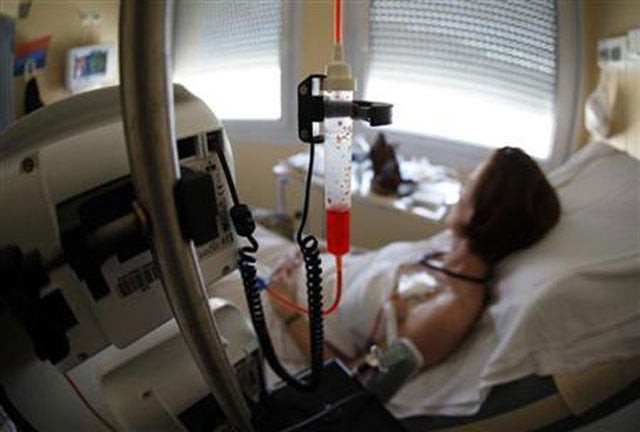Dead could be brought 'back to life' in groundbreaking project
The first trial of its kind will begin at Anupam Hospital in Rudrapur, India

A patient receives treatment in a hospital. PHOTO: REUTERS
A biotech company in the US, has been granted ethical permission to recruit 20 patients to test whether parts of their central nervous system can be brought back to life.
“This represents the first trial of its kind and another step towards the eventual reversal of death in our lifetime,” Dr Ira Pastor, the CEO of Bioquark Inc, said.
Youngest ever conjoined twins separated in Switzerland: report
“We just received approval for our first 20 subjects and we hope to start recruiting patients immediately from this first site – we are working with the hospital now to identify families where there may be a religious or medical barrier to organ donation.”
"To undertake such a complex initiative, we are combining biologic regenerative medicine tools with other existing medical devices typically used for stimulation of the central nervous system, in patients with other severe disorders of consciousness. We hope to see results within the first two to three months," he added.
The trial, which will begin at the Anupam Hospital in Rudrapur, Uttarakhand India, will have participants that have been certified dead and will be kept alive through life support. They will be monitored for several months through brain imaging equipment to check for signs of regeneration, particularly in the upper spinal cord, which is the lowest region of the brain stem, responsible for controlling breathing and heartbeat.
The ReAnima Project has received approach from an Institutional Review Board at the National Institute of Health in the US and in India.
Surgery for Bangladesh’s ‘Tree Man’ to remove warts
The trial will include a combination of therapies, such as injecting the brain with stem cells and a cocktail of peptides, as well as deploying lasers and nerve stimulation techniques that help bring patients out of comas.
The team believes the brain stem cells may be able to erase their history and re-start life again, based on their surrounding tissue –- a process seen in the animal kingdom in creatures like salamanders who can regrow entire limbs.
Brain stem death is when a person no longer has any brain stem functions and has permanently lost the potential for consciousness and the capacity to breathe.
Although brain dead humans are technically no longer alive, their bodies can often still circulate blood, digest food, excrete waste, balance hormones, grow, sexually mature, heal wounds, spike a fever, gestate and even deliver a baby.
“Through our study, we will gain unique insights into the state of human brain death, which will have important connections to future therapeutic development for other severe disorders of consciousness, such as coma, and the vegetative and minimally conscious states, as well as a range of degenerative CNS conditions, including Alzheimer's and Parkinson's disease,” said Dr Sergei Paylian, Founder, President and Chief Science Officer of Bioquark Inc.
Conjoined twins die in Bangladesh
Dr Dean Burnett, a neuroscientist at the Cardiff University’s Centre for Medical Education, said, “While there have been numerous demonstrations in recent years that the human brain and nervous system may not be as fixed and irreparable as is typically assumed, the idea that brain death could be easily reversed seems very far-fetched, given our current abilities and understanding of neuroscience.”
“Saving individual parts might be helpful but it's a long way from resurrecting a whole working brain, in a functional, undamaged state,” he added.
This article originally appeared on Telegraph.



















COMMENTS
Comments are moderated and generally will be posted if they are on-topic and not abusive.
For more information, please see our Comments FAQ